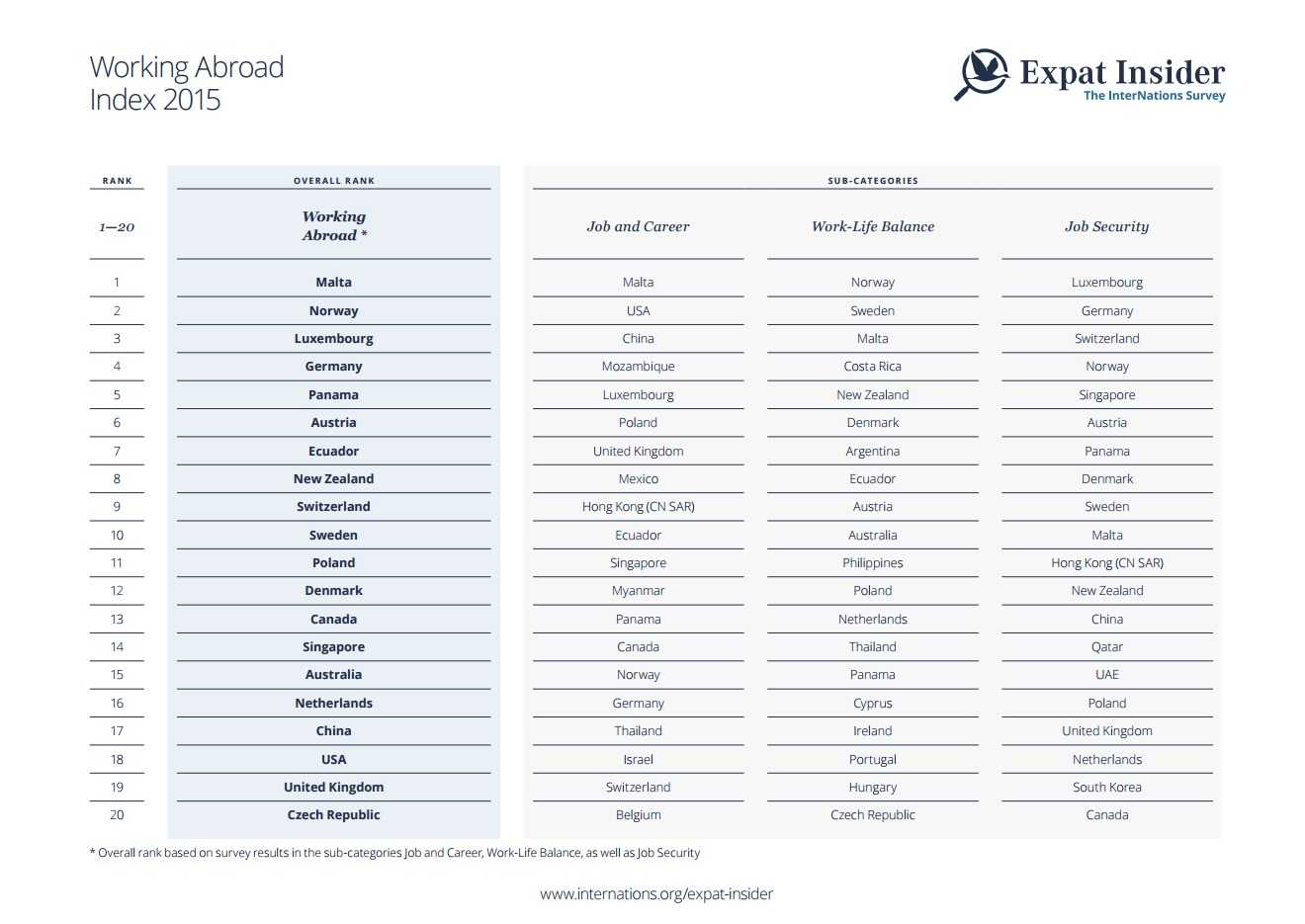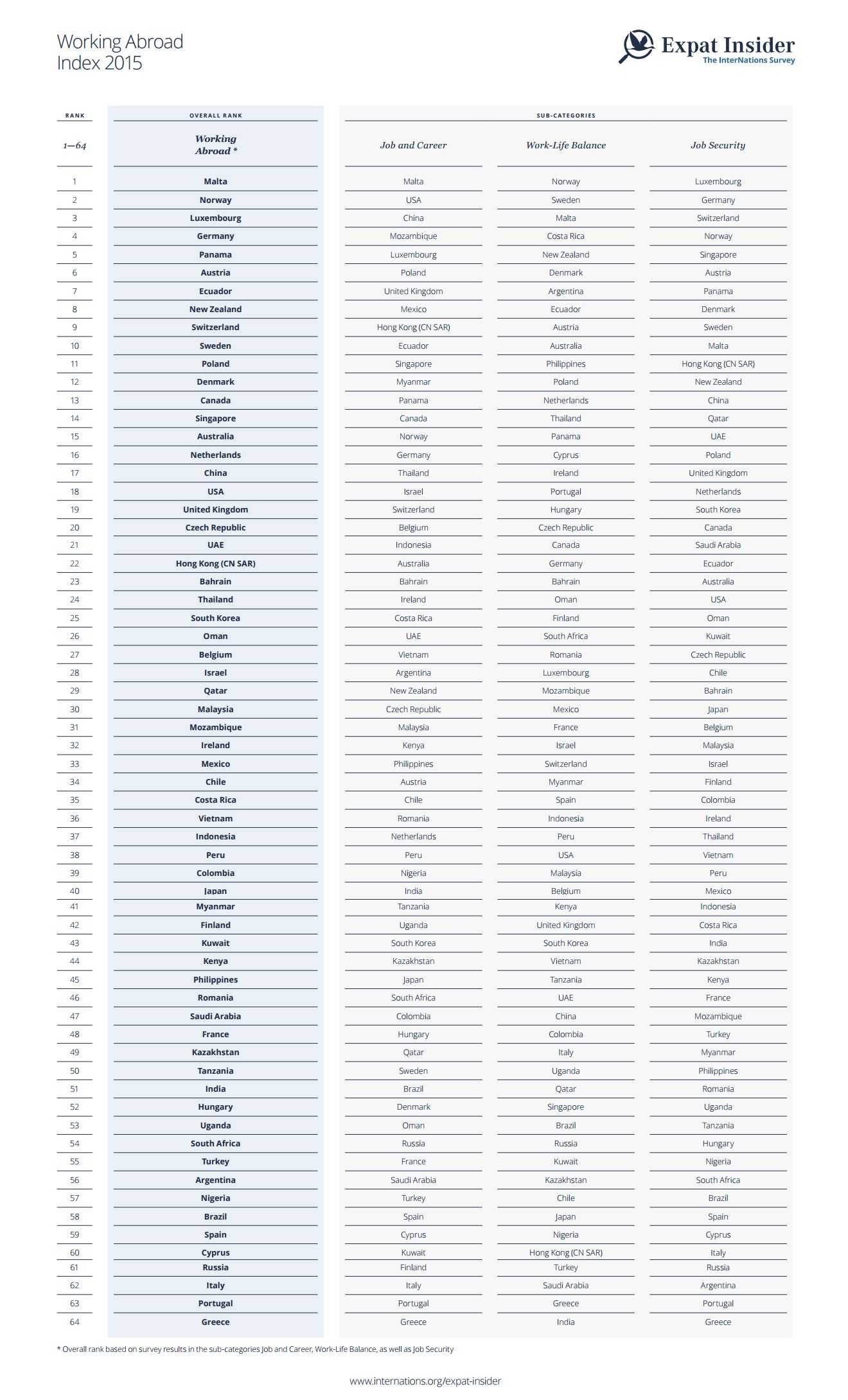Where Expats Love to Work Abroad in 2015
Malta attracts IT professionals and Norway entices with its favorable work-life balance, while expats in Luxembourg enjoy excellent job security.
Methodology
This year, 64 countries are featured in the Working Abroad Index. This index examines various factors from three different areas: job and career, work-life balance, and job security. The minimum sample size to be included in the ranking is 50 respondents, although nearly 40 countries had a sample size of over 100. Questions were rated on a scale of one to seven.
Working Abroad Index: Top 20

Comparisons with Expat Insider 2014
Malta, a new country in this year’s survey, pushed Norway down to second place in the Working Abroad Index. Norway dropped down to fourth place from first for job security but again ranked first for work-life balance. Luxembourg and Germany hold the two places after Norway, just as they did last year. Luxembourg has remained at third place despite a big drop in the Work-Life Balance subcategory (from 6th to 28th place). On the other hand, Kuwait is one country that made noticeable improvement this year, jumping from 59th to 43rd place.
Malta: Straight to the Top
Malta, which didn’t have enough respondents to feature in last year’s survey, is at first place overall in the Working Abroad Index. It also ranks first for overall job satisfaction, with seven in ten expats generally satisfied and 27% even completely satisfied, compared to a global average of 16%. In terms of career prospects, only the USA and the United Kingdom rank higher. Two-thirds of expats in Malta (67%) are generally pleased with their career prospects and two in ten couldn’t be happier (19%). Interestingly, however, another two in ten (21%) do not agree at all that relocating to Malta was a good move for their careers, next to a global average of 6%.
In Malta, survey participants are less likely to be in a traditional employee/manager role than the global average (36% vs. 47%). Compared to 5% globally, in Malta 8% of expats are self-employed professionals. There are also between two and six percentage points more retirees, homemakers, and independently wealthy expats than among the global survey population.
Among those expats who do have to earn a living, jobs in the IT and gaming sector dominate (22%), compared to the overall average of 10%. This may be due to the high number of gaming companies which have begun operating out of Malta over the last few years. Expats working in Malta are also likely to work in the hospitality and tourism sector (13%), retail and trade (16%), as well as recreation and entertainment (9%).
Malta holds third place in the Work-Life Balance subcategory. Two-thirds are generally satisfied with their work-life balance (67%) and three in ten (31%) are completely satisfied, almost double the global average of 17%. Seven in ten expats (69%) are generally satisfied with their working hours. More expats work part-time in Malta than the global average (20% and 14%, respectively). Expatriates who do have a full-time job work an average of 42.7 hours a week, still below the global average of 44.9 hours. It is important to note that only 62% of the expats in Malta have either a full-time or part-time job. The remaining expats are looking for work, are stay-at-home parents, are students, are retired, etc.
Malta doesn’t rank as well in the Job Security subcategory, with only 15th place for the state of the economy. However, this still means that 82% of expatriates consider the state of the economy generally good and not one respondent thinks it is very bad. When it comes to job security itself, a majority of expats in Malta are generally satisfied with it (62%).
Compared to the global averages, a lower percentage of expats moved to Malta for purely job-related reasons. Only 3% were sent by their employer and 4% found a job there on their own (both global averages are 13%). One-quarter of respondents in Malta say they primarily moved for a better quality of life, making it the country with the highest percentage for this option. Also, three-quarters say they were thinking about the weather and climate before their move.
Norway: Excellent Work-Life Balance
Norway didn’t make any big jumps in either direction in this year’s Working Abroad Index, dropping down to second place. In the Work-Life Balance subcategory, Norway continues to excel, holding on to first place. Well over the global average of 19% are completely satisfied with their working hours (30%). This is despite the fact that, with 7% of working respondents, only half the global average of 14% work part-time. Expats in Norway with a full-time job work an average of 40.4 hours per week, significantly below the global average of 44.9 hours.
Norway moved down from first place to fourth place in the Job Security subcategory. Seven out of ten expats (69%) are generally satisfied with their level of job security and only 1% are not at all satisfied; overall this number lies at 5%. A full 93% are generally happy with the state of the economy and over twice the global average of 25% think it is very good (53%). In Norway, the oil and gas sector employs seven times the number of expats than the global average (28% vs. 4%) and plays a pivotal role in the country’s economy.
Despite this strong economy, Norway only comes in 17th place in terms of career prospects. Only six in ten respondents are generally pleased with their current prospects and the same percentage generally agrees that they improved their career opportunities by moving to Norway (slightly less than the global average of 63%). A majority of expats (53%) chose the labor market or economy as one of the three factors that was on their mind the most before their move.
Three-quarters of expats in Norway are generally satisfied with their jobs. The survey respondents who are working but not self-employed tend to be employees rather than managers. Only 2% report working in top management positions, compared to a global average of 11%. Somewhat less than the overall average moved to Norway for job-related reasons and no one moved there to open their own business. On the other hand, 18% primarily moved to Norway for love, next to only one in ten overall.
Luxembourg: The Securest Jobs
Luxembourg remains in the top three in the Working Abroad Index in this year’s survey, despite a dramatic drop down to 28th from 6th place in the Work-Life Balance subcategory. Compared to Malta and especially Norway, expats working in Luxembourg are much less happy with their working hours. Only 68% are generally happy with them and 8% are not happy at all. Slightly more expats (71%) are overall satisfied with their work-life balance, but 7% consider it very bad. One in ten expats in Luxembourg is working part-time (less than the global average of 14%). The average number of working hours per week for those with a full-time job is 42.6, still under the global average of 44.9 hours.
Luckily, Luxembourg moved up one spot from second to first in the Job Security subcategory. What they’re missing in their work-life balance, expats in Luxembourg make up for in job security. Roughly two-thirds of expats (68%) are generally satisfied with their level of job security and 27% are even completely happy (global average: 16%). Only Switzerland and Singapore got better rankings for the state of the economy, with 63% of expats in Luxembourg saying it is very good, well over double the overall average of 25%.
With Luxembourg ranking fifth in the Jobs & Career subcategory, 70% of respondents are generally satisfied with their jobs and one-fifth couldn’t be happier. Two-thirds (65%) are generally satisfied with their career prospects and over three-fourths (76%) are in overall agreement that their relocation to Luxembourg was a good move for their career.
Full Ranking

Further Reading
- Expat Insider 2015 – All Work, No Play? Work-Life Balance and Working Hours
- Expat Insider 2015 – Expat Managers around the World
- Working in Norway
- Working in Luxembourg
- Working in Malta
- Working Abroad – a comprehensive guide for expats
- How to Find a Job Abroad – tips for your international job search
- Expat Insider 2014 – Working Abroad Index
- Malta Gaming Authority: The Gaming Industry Keeps Flourishing in Malta
- Norwegain Government website on oil and gas
Advertisement
Join InterNations
The community for expats worldwide
Download

